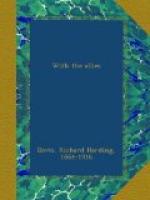The sense of drama told him it was a good exit line, and he returned to the group of officers. I now saw what had happened. At Enghien I had taken the wrong road. I remembered that, to confuse the Germans, the names on the sign-post at the edge of the town had been painted out, and that instead of taking the road to Soignes I was on the road to Ath. What I had seen, therefore, was an army corps making a turning movement intended to catch the English on their right and double them up upon their centre. The success of this manoeuvre depended upon the speed with which it was executed and upon its being a complete surprise. As later in the day I learned, the Germans thought I was an English officer who had followed them from Brussels and who was trying to slip past them and warn his countrymen. What Rupert of Hentzau meant by what I had seen on the road was that, having seen the Count de Schwerin, who commanded the Seventh Division, on the road to Ath, I must necessarily know that the army corps to which he was attached had separated from the main army of Von Kluck, and that, in going so far south at such speed, it was bent upon an attack on the English flank. All of which at the time I did not know and did not want to know. All I wanted was to prove I was not an English officer, but an American correspondent who by accident had stumbled upon their secret. To convince them of that, strangely enough, was difficult.
When Rupert of Hentzau returned the other officers were with him, and, fortunately for me, they spoke or understood English. For the rest of the day what followed was like a legal argument. It was as cold-blooded as a game of bridge. Rupert of Hentzau wanted an English spy shot for his supper; just as he might have desired a grilled bone. He showed no personal animus, and, I must say for him, that he conducted the case for the prosecution without heat or anger. He mocked me, grilled and taunted me, but he was always charmingly polite.
As Whitman said, “I want Becker,” so Rupert said, “Fe, fo, fi, fum, I want the blood of an Englishman.” He was determined to get it. I was even more interested that he should not. The points he made against me were that my German pass was signed neither by General Jarotsky nor by Lieutenant Geyer, but only stamped, and that any rubber stamp could be forged; that my American passport had not been issued at Washington, but in London, where an Englishman might have imposed upon our embassy; and that in the photograph pasted on the passport I was wearing the uniform of a British officer. I explained that the photograph was taken eight years ago, and that the uniform was one I had seen on the west coast of Africa, worn by the West African Field Force. Because it was unlike any known military uniform, and as cool and comfortable as a golf jacket, I had had it copied. But since that time it had been adopted by the English Brigade of Guards and the Territorials. I knew it sounded like fiction; but it was quite true.




